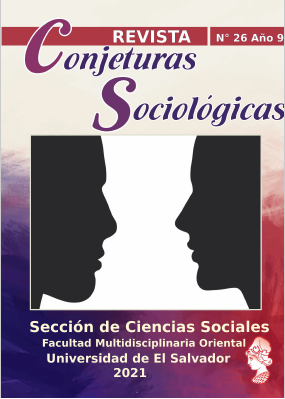Hablando de saberes y persistencias culturales
Palabras clave:
Saberes tradicionales, interculturalidad, yoreme-mayo, persistencias culturales, horizontalidadResumen
Saberes y persistencia cultural, dos conceptos que deben estar siempre acompañados en la discusión de trascendencia de los pueblos originarios. Dar voz al sujeto que por siempre se ha visto como objeto de estudio es sin duda abonar en una responsable traducción intercultural a partir de la interpretación del mundo vista desde una pluralidad de culturas y a la existencia como lo menciona Boaventura de Sousa Santos “una ecología de saberes”. Las experiencias que guardan entre y para si los pueblos originarios producto de su relación con la madre tierra han construido conocimientos que a pesar del patriarcado epistemológico de occidente ha trascendido muy a pesar de que algunas academias científicas le otorgan el calificativo de saberes. Si algo han aprendido los pueblos originarios es a trascender, este solo hecho significan siglos de lucha por la persistencia tanto como pueblo como por el acumulamiento de conocimiento que en muchos de los casos se resguarda y se transmite de manera oral de generación en generación. Ese alejamiento de las ciencias con la naturaleza ha causado desequilibrios ambientales muy serios, como prueba basta con ver los tiempos actuales la humanidad padece una de las crisis de salud más severas de su historia. Para los yoreme mayo del norte de Sinaloa y para todos los pueblos originarios de América y el Caribe, la importancia de los saberes es una manera de reencontrarse con su juya ánia, reconciliación sustentada en el respeto armonioso y reciproco que permitan una sana convivencia entre hombre y naturaleza.
Descargas
Referencias
Argueta. V. A y Lorena Pérez (2019) Los saberes tradicionales y los desafíos para el dialogo de conocimientos. DMA, Vol. 50. DOI. Portugal.
Battyhány K. (2020), Prologo en: Investigar en sociales: proyectos, políticas y desafíos / compilado por Liliana Córdoba; María Josefina Pividori; Jorge Andrés Echeverry-Mejía. - 1a ed volumen combinado. - Córdoba
De Sousa S. B. (2018) Construyendo las Epistemologías del Sur: para un pensamiento alternativo de alternativas; compilado por María Paula Meneses... [et al.]. - 1a ed. - Ciudad Autónoma de Buenos Aires. CLACSO.
De Sousa S.B. (2019) Educación para otro mundo posible, 1a ed. Ciudad Autónoma de Buenos Aires: CLACSO; Medellín: CEDALC.
Ceceña A. E. [coordinadora] (2008) de los saberes de la emancipación y de la dominación. 1a ed. - Buenos Aires: Consejo Latinoamericano de Ciencias Sociales CLACSO.
Corona, B. S. (2019) Producción horizontal del conocimiento, CALAS, Universidad de Guadalajara, México.
Esteva, G. (2019) El camino hacia el dialogo de saberes, pág. 133-165. En Dialogo y conflicto interepistemicos en la construcción de una casa común. Stefano Sartorello, Coord. Universidad Iberoamericana, México.
FIGUEROA V. A. (1991) Identidad y estrategias de persistencia cultural entre los cahitas En: Alteridades, vol. 1, núm. 2, 1991, pp. 53-61 Universidad Autónoma Metropolitana Unidad Iztapalapa Distrito Federal, México.
Kaltmeier, O. (2020) Horizontal en lo vertical. ¿O cómo descolonizar las metodologías en contextos de extrema desigualdad y de la crisis planetaria? Pág. 93, 122, En: Horizontalidad: hacia una crítica de la metodología / Inés Cornejo... [et al.] ; editado por Mario Rufer;- 1a ed. - Ciudad Autónoma de Buenos Aires: CLACSO; México: Centro de Estudios Latinoamericanos Avanzados -CALAS, 2020.
León, P. M. (2019) Las lenguas indígenas en el tercer milenio. En revista de la Universidad Iberoamericana Lenguas indígenas en México. Páginas 4, 8. www.ibero.mx/revistaibero/. México.
Meneses, P. (2020), Presentación: La cruel pedagogía del virus, de Boaventura de Sousa Santos 1a ed. - Ciudad Autónoma de Buenos Aires:
CLACSO, 2020. Libro digital, PDF - (Masa Crítica / Batthyany, Karina).
Pratt, M. L. (2010) Ojos imperiales. Literatura de viajes y transculturación; trad. de Ofelia Castillo - México: FCE.
Villarroel, T y Mariscal J.C. (2010) Innovación tecnológica a partir del diálogo de saberes: Pautas metodológicas y experiencias. Editorial AGRUCO, Bolivia.
Rockwell, E. y Hamel R. E. (2019) Celebrando las lenguas indígenas de América, Grupo de trabajo Educación e interculturalidad. CLACSO, México.: Universidad Nacional de Córdoba. Facultad de Ciencias Sociales, Argentina.
Roitman R. M. (2008) Pensar América Latina. El Desarrollo de la sociología latinoamericana. Buenos Aires: CLACSO.
Ubuntu: una invitación para comprender la acción política, cultural y ecológica de las resistencias afroandina y afropacífica, Marilyn Machado Mosquera... [et al.] ; editado por Alicia Marta Cardona. - 1a ed. - Ciudad Autónoma de Buenos Aires: CLACSO, 2018
Publicado
Número
Sección
Licencia

Esta obra está bajo una licencia internacional Creative Commons Atribución-NoComercial 4.0.
Los autores continúan como propietarios de sus trabajos, cediendo de manera no exclusiva los derechos de difusión a la Revista Conjeturas Sociológicas bajo los estándares de la Licencia Creative Commons Atribución No Comercial 4.0 Internacional (CC BY NC 4.0).





